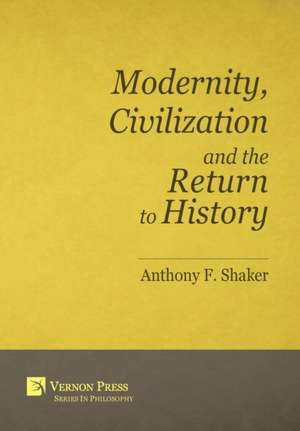Modernity, Civilization and the Return to History
Autor Anthony F Shakeren Limba Engleză Hardback – 26 ian 2017
| Toate formatele și edițiile | Preț | Express |
|---|---|---|
| Paperback (1) | 412.52 lei 6-8 săpt. | |
| Vernon Press – 6 mar 2017 | 412.52 lei 6-8 săpt. | |
| Hardback (1) | 570.77 lei 6-8 săpt. | |
| Vernon Art and Science – 26 ian 2017 | 570.77 lei 6-8 săpt. |
Preț: 570.77 lei
Preț vechi: 620.40 lei
-8% Nou
Puncte Express: 856
Preț estimativ în valută:
109.25€ • 118.71$ • 91.83£
109.25€ • 118.71$ • 91.83£
Carte tipărită la comandă
Livrare economică 21 aprilie-05 mai
Preluare comenzi: 021 569.72.76
Specificații
ISBN-13: 9781622731848
ISBN-10: 1622731840
Pagini: 586
Dimensiuni: 157 x 235 x 36 mm
Greutate: 1 kg
Editura: Vernon Art and Science
ISBN-10: 1622731840
Pagini: 586
Dimensiuni: 157 x 235 x 36 mm
Greutate: 1 kg
Editura: Vernon Art and Science
Notă biografică
Anthony F. Shaker is a philosopher, scholar of Islamic thought/civilization, and analyst of social theory. He has authored numerous articles and books, including the only complete study of ¿adr al-D¿n Q¿naw¿'s thought (d. 1274 CE) and two translated volumes of Ghaz¿l¿'s I¿y¿' al-¿ul¿m. He also served as an elected member of the executive council of the Canadian parliament's official opposition, helping formulate policy and conferring with various political leaders. He is currently exploring the idea of productive dialogue within the framework of civilization, not only as a channel of passive exchange across cultures. He obtained his doctorate from McGill University and currently lives with his wife in Quebec, Canada.
